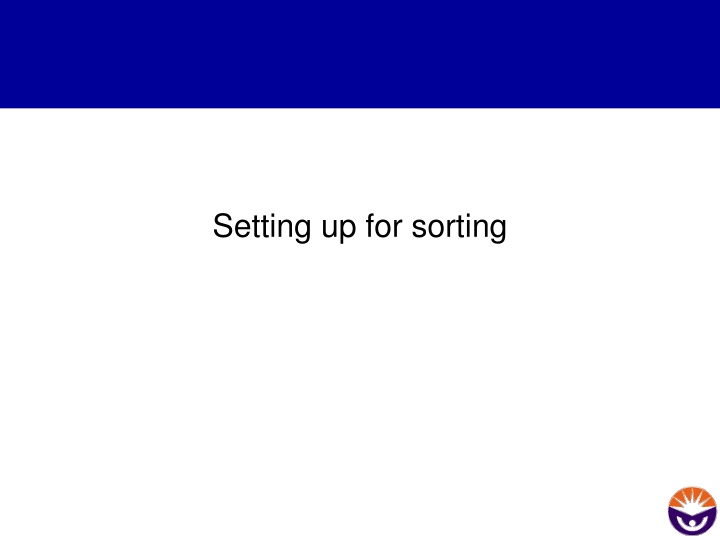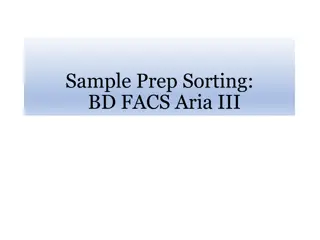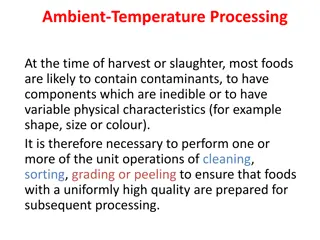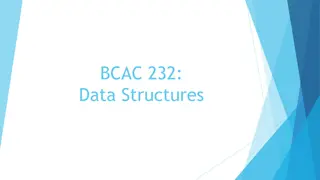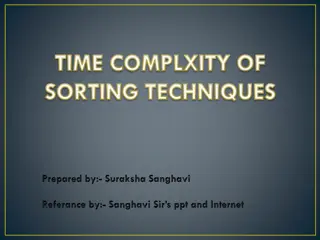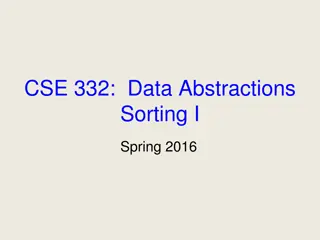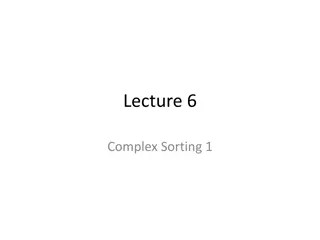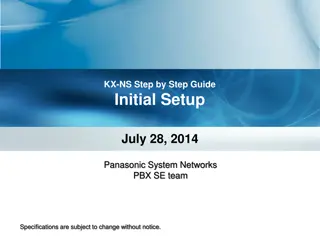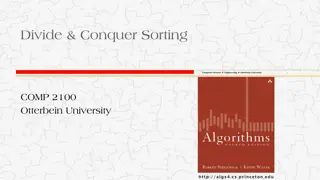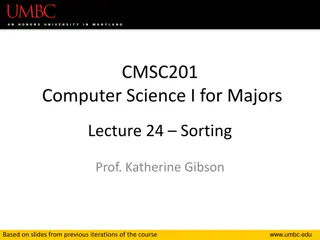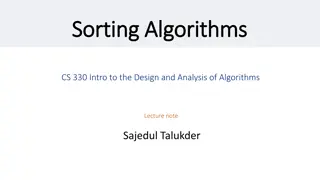Efficient Setup and Maintenance for Sorting Process
Efficiently set up and maintain the sorting process by following key steps such as preparing the instrument and adjusting the angle of the plates, turning on the stream and monitoring its stability, checking droplet images for proper sorting, applying voltage to the plates, and selecting appropriate collection devices. Ensure smooth operation and optimal performance in your sorting procedures.
Download Presentation

Please find below an Image/Link to download the presentation.
The content on the website is provided AS IS for your information and personal use only. It may not be sold, licensed, or shared on other websites without obtaining consent from the author.If you encounter any issues during the download, it is possible that the publisher has removed the file from their server.
You are allowed to download the files provided on this website for personal or commercial use, subject to the condition that they are used lawfully. All files are the property of their respective owners.
The content on the website is provided AS IS for your information and personal use only. It may not be sold, licensed, or shared on other websites without obtaining consent from the author.
E N D
Presentation Transcript
Prepare the instrument Sort plates Take the sort plates out and clean them carefully. Insert the plates carefully and adjust the angle The plates should not be too close together to prevent sparking and thus damage to the electronics
Turning on the stream Turn the fluidics on Monitor the stream image and check the stream stability in the sort chamber Load a sort setting (High/Medium/Low) from the Instrument Menu Check the droplet image, if necessary adjust frequency and amplitude Turn SweetSpot on to monitor and automatically adjust the breakoff image
Droplet image Processed image from the video capture card. Real life image of the stream taken from the video monitor. Notice the ligament extending from the last connected drop and the minor fast satellite drops which will melt with the main drops on their way down. Drops are visible because the stream is illuminated by a stroboscope lamp which is driven by the drop drive frequency.
Droplet image Remember to check the satellite drops. There should be only few of them, and they should be of the fast type. This is a bad example: Slow satellite drops will never merge and always give bad side streams. It is of no use trying to sort with this kind of image!
Applying voltage to the plates Turn the plate voltage on in the software Use a lower voltage setting at the beginning (avoid spraying onto the plates) Small adjustment to the center stream can be applied via the slider in the stream window.
Setup the collection devices Select the appropriate collection device(s) and the corresponding holder assembly: Tubes (15 ml, 5 ml or 1ml) 2 way holder for 15 ml tubes 4 way holder for 5 and 1 ml Plates, Slides, Petri-Dishes ACDU assembly
The collection devices The QuadraSort tube holder offers four positions for collection tubes. It can be connected to the internal cooling system. The ACDU can hold a variety of plates and collection devices.
Tubes Put the holder assembly into the instrument and place empty tubes into the holder Adjust Plate Voltage to low Turn Test Sort on Inspect the side streams on the AccuDrop monitor Adjust the plate voltage to separate the streams
Adjusting the drop charge pattern Every time a drop is charged,the following drops will have a certain charge with the reverse polarity. - 4th Thus the center stream splits up into several streams. Also the side streams will be affected. -- 3rd To get an optimal center stream, we have the possibility to apply the 2nd --- +++ 2nd, 3rd and 4th drop charge These values will reunite the splitted center stream.
Adjusting the side streams Deflect the four streams with the slider control in the software. As a rule of thumb, use about 45% deflection for the inner and 90% deflection for the outer streams. Adjust the Plate Voltage until all streams are well separated and hit the tubes.
Stability check If everything looks fine, allow the system to run for at least 30 min. After this time period, check: Position of the breakoff point Image of the stream Center and side stream quality If everything is still good, continue with the determination of the drop delay
AccuDrop Fast, easy and reliable determination of the drop delay
What is the drop delay? At the very moment when the cell is analysed, it is still quite far away from the droplet formation point. Thus, somehow the information to charge a drop must be delayed until the cell of interest has reached this breakoff point.
The breakoff point and the drop delay Cell of interest analysed The stream has to be charged when the cell of interest arrives at the last droplet. This delay in charging the stream is called the drop delay. Traditionally, it is measured in virtual drops rather than microseconds. Drop delay Sort pulse for this cell
Classical Method by counting drops 1. The distance between Laser interception point and the droplet breakoff point is determined 2. This distance is now extended downwards and the number of drops in this area is counted. 3. This number is the drop delay in virtual drops .
Expected values for the drop delay The expected drop delay can be mathematically calculated, as it is depending on: the nozzle size (bigger or smaller drops) the frequency the amplitude sheath pressure However, the correct value is always determined live on the instrument as it also depends on: air pressure air humidity air temperature
BD Accudrop The AccuDrop system consists of a red diode laser for stream illumination, a filter block and a CCD-camera mounted in the back of the sort chamber. Additionally, BD AccuDrop beads are required for proper function of the AccuDrop system.
BD AccuDrop Schematic overview Without filter, the AccuDrop camera shows a picture of the streams with the intercept points of the laser. Red diode laser With the filter in place, only the fluorescence signals of the AccuDrop beads can be seen on the screen. Red diode laser
Additional benefits In addition to finding the correct drop delay, AccuDrop allows the easy monitoring of side stream quality and stability during sorting. Fanning side streams can be easily seen and ineffective setups can be identified prior to sorting valuable cells.
Live pictures Monitoring the stream quality without filter
How to use it Set-up Prepare a tube with 1 drop of AccuDrop beads in 2 ml of FACSFlow. Run the beads on the instrument Make a dotplot of FSC against SSC Make a population P1 in the lower right corner of the plot, thereafter invert P1 in the Population Hierarchy. Make a new Sort Layout Select 2 or 4 tubes, depending on your desired application Select INITIAL as sort mode Start to Sort
Sort Drawer and Plate voltage If you receive a warning that the plates are not on and/or the waste drawer is still closed, click CANCEL. Turn the plates on manually if you have not done so. Leave the waste drawer in the closed position. Otherwise we would sort now AccuDrop beads into our tubes.
How to use it - Optimization Adjust the AccuDrop laser so that it illuminates the streams maximally. Turn the red filter in front of the camera Change the drop delay, until nearly all the beads are deflected and the center stream is virtually empty. The system supports you with two boxes and percentages of events in each box. Change the sort mode to FINE TUNE and repeat the optimization. There should be a narrow bandwith in this mode for the optimal drop delay.
Determining the drop delay Wrong drop delay, most beads remain in the center stream.
Determining the drop delay Correct drop delay, all beads are deflected correctly to the left side
Live pictures Determining the drop delay with filter in, Sorting in Initial mode
Live pictures Determining the drop delay with filter in, now sorting in FineTune
Importance Determining the correct and robust drop delay is one of the most important steps in the machine setup. With a wrong drop delay, no cells or wrong cells reach your collection tube.
Selecting the collection device Make a new sort layout in the software and choose whether to sort 2 or 4 populations.
Selecting the poplations Click on each field and select the population you want to sort and the desired number:
Selecting the poplations Select the sort precision
Selecting the poplations Open the waste drawer and thereafter start the sorting (moving the drawer during sorting may result in spray and a minimal contamination, so it is best to avoid it, except during a clog)
QuadraSort Although 4-way sorting is by no means more complicated than 2-way sorting, some precautions should be taken: During 4-way sorting avoid using a yield mask. With 4 sidestreams it is best to do a one drop sort only. This reduces fanning and possible contaminations.
